Finding Help on the WebThe original JavaScript documentation is found at Netscape's Web site, but there's a lot of good information at sites from Microsoft and independent JavaScript pages. Here are some of the best JavaScript Web sites. Mozilla sitesSince Netscape developed JavaScript, it's no surprise that the Mozilla project, the open-source creators of Mozilla and Firefox (the successors to Netscape's browser), has lots of great information about the language and further development. Core JavaScript Guide 1.5http://developer.mozilla.org/en/docs/Core_JavaScript_1.5_Guide This site (Figure D.1) is designed for the beginning JavaScript user. It gives you a rundown on the basics of the language, and definitions and explanations of the concepts used in JavaScript. Overall, the Core JavaScript Guide suffers from a moderately geeky difficulty level and sketchy examples, but you should be able to puzzle it out once you've digested this book. For you harder-core programming types, this site will be a piece of cake. Figure D.1. Mozilla's Core JavaScript Guide is a good place for you to start furthering your knowledge of JavaScript.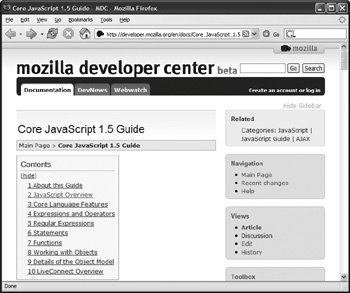
Core JavaScript Reference 1.5http://developer.mozilla.org/en/docs/Core_JavaScript_1.5_Reference This is a reference guide to JavaScript 1.5. When you need to look up the syntax of a particular object, you'll find it here. Figure D.2 gives you a look at the Core JavaScript Reference site. Figure D.2. Mozilla's Core JavaScript Reference is the definitive place to find the answers to questions about the JavaScript language.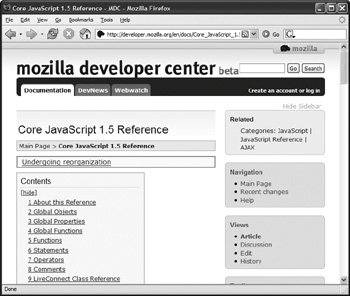
Using Web Standards in Your Web Pageshttp://www.mozilla.org/docs/web-developer/upgrade_2.html This Mozilla-hosted site is a great guide to making the transition to writing pages that adhere to current Web standards. By writing standards-compliant JavaScript and XHTML, your pages will operate on the widest possible set of browsers. Figure D.3 shows the Spartan front page of this site. Figure D.3. This Mozilla site has lots of good tips on keeping your pages working across platforms.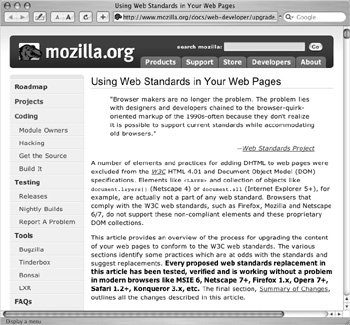
Venkman, the Mozilla JavaScript debuggerhttp://developer.mozilla.org/en/docs/Venkman When you need to debug your JavaScript, it certainly would be nice to have a good tool to use to help you. Wish no longer; Venkman, the JavaScript debugger from the Mozilla project, is a pretty good tool that works with Firefox, Thunderbird, Mozilla, and Netscape 7 and allows you to step through your code, setting breakpoints, inspecting objects and variables as the script executes, and working with JavaScript source code. Figure D.4 shows you the Venkman home page. Figure D.4. When you need a JavaScript debugger, Mozilla's Venkman is a good choice.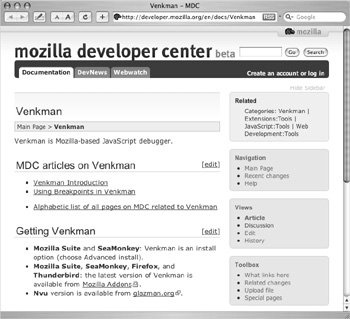
Other great JavaScript sitesWhen you get away from the Netscape sites, you'll find an amazing number of places where you can pick up script examples, find tutorials, and ask questions of JavaScript experts. Here are some of the best sites at the time we wrote this, but as usual on the Web, these sites could change or even go away by the time you read this. Microsoft's Scripting Languages pagehttp://msdn.microsoft.com/ie/SCR/ Microsoft's competing version of JavaScript, called JScript, has its own pages on the Microsoft Developer network site (Figure D.5), where you can learn the similarities to (and differences from) from Mozilla's JavaScript. You'll find a detailed JScript Language Reference and the JScript Users Guide. Figure D.5. Microsoft's Scripting Languages Web page gives you the lowdown on JScript, Microsoft's important JavaScript variant.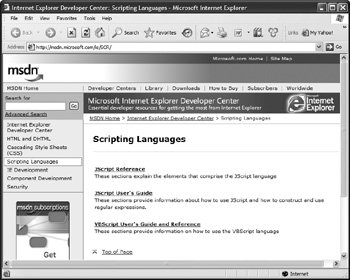
Yahoo! User Interface Libraryhttp://developer.yahoo.com/yui/ Yahoo! JavaScript Developer Centerhttp://developer.yahoo.com/javascript/ Yahoo! Design Pattern Libraryhttp://developer.yahoo.com/ypatterns/ These three sites are excellent resources for JavaScript and new Ajax developers. The Yahoo! User Interface Library is a set of utilities and controls, written in JavaScript, for building richly interactive Web applications using techniques such as DOM scripting and AJAX. All of the examples are open source and can be used freely in your pages. The Yahoo! JavaScript Developer Center provides documentation for using Yahoo!'s JavaScript frameworks and APIs, and many code samples you can use to learn about JavaScript and Ajax. The Yahoo! Design Pattern Library (Figure D.6) provides many usable examples of JavaScript interface solutions that can be downloaded and dropped into your sites. Figure D.6. You'll find many great JavaScript and Ajax examples at Yahoo!'s JavaScript developer pages. The Design Pattern Library gives you access to premade user interface solutions that you can integrate into your own sites.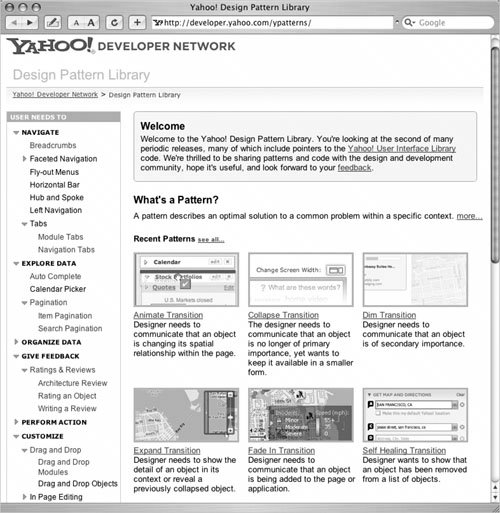
QuirksModePeter-Paul Koch is a JavaScript developer in the Netherlands. The best thing about his site (Figure D.7) is that it is amazingly upto-date with the latest news about browsers and their JavaScript capabilities. It has many excellent scripts for your copying pleasure. It's not a tutorial site, but there is a great deal of basic information that will be helpful to the beginning scripter. Figure D.7. Peter-Paul Koch's QuirksMode site often has JavaScript information well ahead of any others.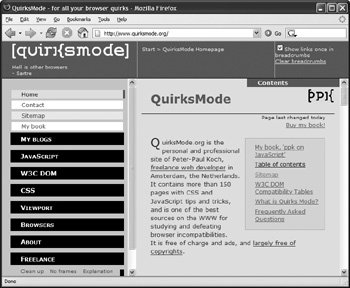
Web Standards Project's DOM Scripting Task Forcehttp://domscripting.webstandards.org/ The Web Standards Project lobbies browser and tool makers to make their products adhere to Web standards, and the DOM Scripting Task Force (Figure D.8) works to educate users and manufacturers on the benefits of DOM scripting and to promote best practices for scripting. One of the authors of this book (Dori) is co-leader of the Task Force. Figure D.8. The Web Standards Project's DOM Scripting Task Force is fighting the good fight for better scripting practices and better scripting tools.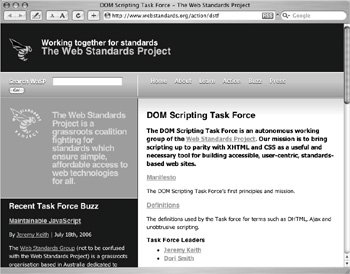
WeblogsThere are many weblogs devoted to JavaScript, Ajax, and DOM Scripting. Here are a few of our favorites, but these by no means form an exhaustive list. DOM Scripting: The BlogYou'll find lots of current information and news on DOM scripting in this blog, written by Jeremy Keith, a Web developer and book author living in Brighton, England. He also plays bouzouki, but he saves writing about it for one of his other blogs (he's the other co-lead of the DOM Scripting Task Force, by the way). AjaxianThis is a very good blog with news, lists of JavaScript and Ajax resources, podcasts with JavaScript and Ajax luminaries, and much more (Figure D.9). It can sometimes get a bit breathless over the fabulousness of Ajax, making you think that it's the cure for cancer and a terrific dessert topping all rolled into one, but we're sure that the blog's perspective will mellow over time. It also has a bad habit of being a little confused about what Ajax actually is (no, Flash is not any part of Ajax); but we're hoping that it will also learn a little more about that as well. Until then, it's a great site to find out who's doing cool user interface tricks. Figure D.9. The Ajaxian blog is a good destination for JavaScript and Ajax news and information.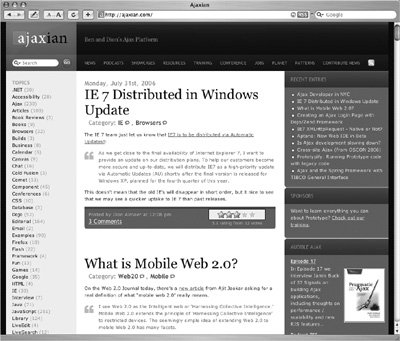
Yahoo! User Interface BlogThis blog is the companion blog for the Yahoo! libraries we discuss in Chapter 16. It has discussions about the Yahoo! Design Pattern Library and the Yahoo! User Interface Library, which help you to efficiently get the most out of today's browsers. The Yahoo! developers are regularly posting, answering questions, and discussing better ways to use their libraries. JavaScript World Scripting Forumshttp://www.javascriptworld.com/forums/ JavaScript World has long been the companion site for this book, where you'll find all the scripts in the book and also resources to help you learn more about JavaScript. In 2006, we added the JavaScript World Forums, a bulletin board where scripters can help each other out when they get stumped with a script problem. Come join our lively community! JavaScript Usenet NewsgroupYou can think of Usenet as a worldwide bulletin board system, where people from everywhere can post messages and join discussions about subjects that interest them. Each subject is called a newsgroup. At last count, there were more than 100,000 newsgroups, covering virtually every subject you can imagine. Naturally, we're interested here in the few newsgroups that are devoted to JavaScript. The main Usenet newsgroup for JavaScript is news:comp.lang.javascript, where there are many discussions about scripting, people asking questions about problems that have them stymied, and general talk among JavaScript developers. It's a good place to get answers and pick up tips. Within the newsgroup, there are different discussion topics, or threads. You'll often find that threads begun by other people will apply to your own questions.
|